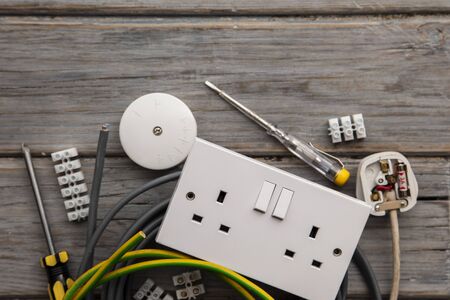Introduction to Smart Meters in the UK
Smart meters have become a cornerstone of the ongoing transformation in how energy is managed and consumed within British homes. These advanced devices automatically record energy usage in real time, transmitting accurate readings directly to energy suppliers, thereby eliminating the need for manual meter readings and estimated bills. The UK government, recognising the potential for smarter energy consumption and improved grid efficiency, has spearheaded a nationwide rollout of smart meters as part of its commitment to modernise the country’s energy infrastructure. Under the Smart Metering Implementation Programme (SMIP), every home and small business in Great Britain has been offered a smart meter at no additional upfront cost. This significant initiative aims to provide households with greater transparency over their energy usage, empower consumers to make informed decisions, and support broader climate change objectives by facilitating more efficient use of resources across the national grid.
Legal Framework and Regulatory Obligations
The legal landscape governing the installation and usage of smart meters in UK homes is shaped by a combination of national regulations, statutory obligations, and industry best practices. For landlords, tenants, and energy suppliers, understanding these requirements is essential to ensure compliance and foster harmonious relationships within the residential lettings sector.
Obligations for Landlords
Landlords are not legally obliged to install smart meters in their rental properties; however, they must not unreasonably prevent tenants from requesting or having one installed. Under the Landlord and Tenant Act 1985, landlords are responsible for ensuring that the metering equipment is safe and accessible. If energy bills are included in the rent, landlords may retain control over meter installations but should consult with tenants before making decisions that affect energy management or costs.
Tenants’ Rights and Responsibilities
Tenants have a statutory right to request a smart meter if they are the bill-payer for the property. The energy supplier will generally liaise directly with the tenant regarding installation. However, tenants should review their tenancy agreement as some contracts may require landlord consent for alterations to fixtures or fittings. Best practice dictates that tenants notify landlords of any intention to install a smart meter to maintain transparency and avoid disputes.
Summary Table: Smart Metering Legal Duties
| Party | Legal Duty | Key Considerations |
|---|---|---|
| Landlord | Cannot unreasonably block installation | Responsible for safety; consult with tenant if bills are included in rent |
| Tenant | May request installation if named on bill | Check tenancy agreement; inform landlord before proceeding |
| Energy Supplier | Must offer smart meters to all domestic customers by 2025 (per Government mandate) | Liaises with bill-payer; must comply with Data Protection Act 2018 regarding usage data |
Regulatory Oversight for Energy Suppliers
The rollout of smart meters is regulated by Ofgem and subject to government deadlines, with suppliers required to take all reasonable steps to offer smart meters to every home by 2025. Additionally, suppliers must adhere to strict rules on consumer data privacy under the Data Protection Act 2018, ensuring that personal consumption data is handled lawfully and transparently.
Conclusion
The intersection of statutory rights, contractual obligations, and regulatory mandates creates a robust framework guiding all parties involved in smart metering within UK homes. Stakeholders are encouraged to seek legal advice or consult government guidance when navigating complex scenarios related to installation or usage.

3. Enhancing Energy Efficiency and Usage Awareness
One of the most significant ways in which smart metering is transforming energy usage in UK homes lies in its capacity to provide real-time data and foster a deeper awareness of consumption habits. Traditional meters, with their manual readings and estimated billing, offered little insight into daily or hourly energy use. In contrast, smart meters deliver up-to-the-minute information directly to both consumers and suppliers, establishing a transparent foundation for more informed decision-making.
Real-Time Data: A Game Changer
With smart meters, residents can access detailed breakdowns of their electricity and gas consumption via in-home displays or online portals provided by their energy supplier. This immediate visibility allows households to identify patterns, such as spikes during certain times of day or excessive usage by particular appliances. By pinpointing these trends, residents are better positioned to adjust routines and reduce unnecessary consumption.
Empowering Households
The empowerment granted by this technology cannot be understated. Homeowners and tenants alike can now take proactive measures to control their bills—whether it’s switching off devices left on standby or optimising heating schedules. The data-driven approach enables users to set practical targets for reducing energy use, with tangible feedback available at their fingertips.
Encouraging Sustainable Habits
Beyond individual savings, smart meters are instrumental in encouraging widespread adoption of sustainable practices across UK households. By making the consequences of consumption instantly visible, these devices prompt behavioural changes that benefit both the environment and personal finances. Over time, this increased awareness fosters a culture of accountability and efficiency—key objectives underpinning the UK’s broader commitments to carbon reduction and sustainability.
4. Impact on Billing, Dispute Resolution, and Tenancy Agreements
Smart metering has brought about a paradigm shift in how energy billing and management are handled across UK homes, particularly influencing accuracy in billing, the process of dispute resolution, and the drafting of modern tenancy agreements. Below is an exploration of these transformative effects.
Billing Accuracy Enhanced by Real-Time Data
Traditional estimated billing often led to overcharges or undercharges, creating frustration for both tenants and landlords. With smart meters, real-time consumption data ensures bills reflect actual usage, minimising errors and fostering trust. This heightened precision is especially beneficial in Houses in Multiple Occupation (HMOs) and shared tenancies, where accurate allocation of costs is critical.
| Aspect | Traditional Metering | Smart Metering |
|---|---|---|
| Billing Frequency | Quarterly/Estimated | Monthly/Actual Usage |
| Error Rate | High (Estimates) | Low (Real-Time Data) |
| Transparency | Poor | Excellent |
| User Engagement | Low | High (In-Home Displays) |
Facilitating Dispute Resolution Between Parties
Disputes over energy bills have historically been a source of contention between tenants and landlords. Smart meters provide verifiable records of consumption, streamlining the resolution process. Both parties can access detailed usage histories, allowing for swift identification and correction of anomalies without prolonged disagreement.
Key Benefits:
- Evidentiary Support: Digital logs offer impartial evidence in disputes.
- Reduced Arbitration Costs: Faster resolutions mean fewer legal or mediation fees.
- Improved Relationships: Transparency decreases suspicion and enhances landlord-tenant relations.
The Influence on Modern Tenancy Agreements
The integration of smart metering technology has prompted updates to standard tenancy agreement clauses. Landlords are increasingly specifying responsibilities regarding meter installation, data access rights, and cost allocation. The following table highlights typical clauses influenced by smart metering:
| Clause Area | Traditional Tenancy Agreement | Modern Agreement with Smart Metering |
|---|---|---|
| Meter Access Rights | Manual Reading Access Only | Digital Data Sharing Provisions Included |
| Bills & Payments Clause | Lump-Sum/Estimated Billing Terms | Actual Usage Billing Based on Smart Data |
| Dispute Mechanism Clause | No Reference to Meter Data Logs | Mediation Based on Smart Meter Records Stipulated |
| Responsibility for Installation/Upgrade | No Mention or Tenants Duty to Notify Landlord of Faults Only | Duties Outlined Regarding Upgrades and Maintenance Responsibilities |
Summary of Legal Considerations:
- Lack of Consent Issues: In most cases, tenants require landlord consent before installing a smart meter; tenancy agreements now often address this explicitly.
- Data Privacy: Explicit permissions regarding who may access consumption data are increasingly common.
The adoption of smart metering is reshaping not only technical aspects but also the legal framework governing residential lettings, supporting fairer practices and reducing areas of potential conflict between all parties involved.
5. Privacy, Data Security, and Consumer Rights
As smart meters become an integral feature of UK homes, it is essential to address the privacy and data security implications that accompany their widespread adoption. The information collected by smart meters—such as energy consumption patterns and usage timings—can be sensitive, making robust protection measures a legal and ethical necessity.
Data Protection Standards for Smart Meters
Smart metering in the UK is governed by stringent data protection regulations. Suppliers are required to comply with the General Data Protection Regulation (GDPR) and the Data Protection Act 2018. These laws ensure that personal data collected from smart meters is processed lawfully, transparently, and for specified purposes only. Consumers must be informed about what data is being gathered, how it will be used, and with whom it may be shared.
Consumer Rights under UK Law
UK consumers have explicit rights concerning their smart meter data. They can access the information recorded by their meters, object to certain uses of their data, and request corrections if inaccuracies are found. Importantly, energy suppliers cannot use or share this data for marketing purposes without obtaining clear consent from the consumer.
Responsibilities of Energy Suppliers
Suppliers are under a duty to implement appropriate technical and organisational measures to safeguard consumer data against unauthorised access or breaches. This includes encryption of transmitted information, secure storage solutions, and regular audits of data handling procedures. Any breach affecting consumer data must be reported promptly in accordance with regulatory requirements.
Balancing Innovation with Consumer Confidence
The transformation brought by smart metering relies on maintaining consumer trust through transparency and accountability. UK law strikes a balance between leveraging advanced technology for improved energy efficiency and protecting individual rights. By upholding high standards of privacy and security, both suppliers and consumers can benefit from smarter energy usage while ensuring legal compliance and peace of mind.
6. Future Developments and Market Trends
The UK’s energy landscape is poised for significant evolution as smart metering technology continues to mature. Looking ahead, several key innovations are expected to reshape how British households interact with their energy consumption. One of the most notable trends is the integration of smart meters with broader smart home ecosystems. By linking meters with intelligent thermostats, lighting controls, and electric vehicle charging points, residents will be able to optimise their energy use more seamlessly than ever before.
Integration with Smart Home Technologies
Smart meters are increasingly being designed to work in tandem with a range of Internet of Things (IoT) devices. This interoperability enables homeowners to automate routines based on real-time usage data—such as adjusting heating when rooms are unoccupied or scheduling appliances to operate during off-peak tariff periods. Such advancements not only provide greater convenience but also contribute to long-term cost savings and reduced carbon footprints.
Data-Driven Innovation
As the volume and granularity of energy consumption data grow, suppliers and technology providers are developing new services tailored to consumer habits. For instance, predictive analytics may soon allow suppliers to offer bespoke tariffs based on individual usage patterns. Additionally, enhanced security measures will become critical as data privacy remains a top concern among UK residents.
Anticipated Changes in the Energy Sector
The proliferation of smart metering is set to drive further changes within the UK’s regulatory framework and market structure. Dynamic pricing models, peer-to-peer energy trading platforms, and increased adoption of renewable generation at the household level are all likely outcomes. These shifts will empower consumers with more choice and control over their energy procurement, while incentivising greater efficiency across the sector. Ultimately, smart metering stands at the heart of a more flexible, transparent, and sustainable future for UK homes.


